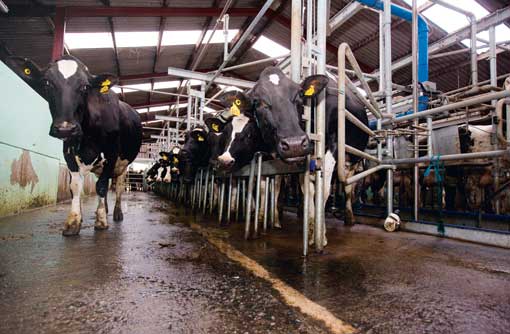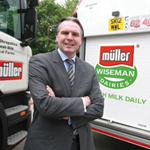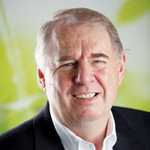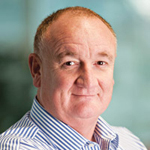Dairy processors – the big four in the spotlight

Dairy processors are vying for farmers’ attention by offering lucrative recruitment packages in a bid to secure more milk. Gemma Mackenzie quizzes the heads of the ‘big four’ on what makes their companies stand out and why they think farmers should supply them
 Ronald Kers, CEO
Ronald Kers, CEO
Why should milk producers stay with or join Muller?
Our non-aligned price is market-leading and we offer a clean and simple scheme.
We are ambitious – no-one has invested as much in the UK as we have – £500m in the past two years. It’s a sign of the confidence we have in the business and the industry. We do feel we can make a big difference.
|
Muller in a minute |
|---|
|
What are your plans for the company?
We have a plan for the next five years to be the largest and most competitive dairy company in the UK.
We want to have the most producers and have the biggest share in the industry – with that I need the greatest amount of milk.
We started as a yogurt company and we bought Wisemans in 2012.
We are now building a butter plant and we are actively looking at other areas of dairy. In the future I would envisage us being in other segments of dairy.
What makes Muller different from other dairy processors?
We have a clear strategy, are very determined to succeed, have a proven track record and we are very ambitious.
 Peter Lauritzen, CEO
Peter Lauritzen, CEO
Why should producers stay with or join Arla?
We are a farmer-owned co-operative and our interests are our dairy farmers. Our vision is to create the future of dairy and secure the highest possible value for farmers’ milk.
We have invested £500m in the UK since 2007, we have some of the strongest brands – Lurpak, Cravendale and Anchor – and are a major supplier to six of the key retailers.
I am sure public limited companies (plcs) care, but we are looking after our farmers. It’s our farmers who decide everything and the profit goes back to them. That’s a true co-op.
|
Arla in a minute |
|---|
|
What are your plans for the company?
We will start processing at our new Aylesbury plant, which will be operational in October. This will secure a long-term home for British milk.
After the merger with Milk Link, we became the UK’s number one cheese manufacturer.
We have launched our Anchor cheddar brand and brought production back to the UK for Anchor butter and spreads.
We will also add some specialities [to the UK market] under our global Castello brand. These investments demonstrate our long-term commitment to British farmers and British milk.
What makes Arla different from other dairy processors?
It’s quite simple. We are working for our farmers – they are the owners of the business.
We have a strong strategy in place, a balanced business in the UK and a global presence. The profits we are making go back to the owners – the farmers.
That is why we are different from plcs and private companies. Everything is decided by farmers. I think it’s a fantastic model – the most successful dairy companies in the world are co-ops.
 Mark Allen, CEO
Mark Allen, CEO
Why should producers stay with or join Dairy Crest?
We pay a fair, transparent price and there are no hidden extras or obligations. Quite often there’s this concept that plcs don’t care about farmers and co-ops do. That’s nonsense.
Our shareholders want the business to grow and develop and for that we need farmers that are paid to supply us with milk, so they are loyal to us and we are fair with them.
|
Dairy Crest in a minute |
|---|
|
What are your plans for the company?
We are a consumer-led business and we focus heavily on trying to add value to our products. In the long term we plan to acquire new businesses in the UK and broaden our product offering.
There are 100,000t of cheddar brought into the UK and that’s a lot to go at in terms of converting these consumers.
In 2001-2 we were producing about 28,000t of cheese at Davidstow and now we are producing about 45,000t.
All through that process we have been investing in that facility. Over the next 12-18 months we will also start to produce whey variants at Davidstow.
What differentiates Dairy Crest from other dairy processors?
The thing that differentiates us is the fact we are a British company. People often say being a publicly-owned company is bad news for farmers, but I would argue the contrary.
It means we have to be open, transparent and visible in what we do and I think farmers should take comfort from that.
 Kate Allum, CEO
Kate Allum, CEO
Why should farmers stay with or join First Milk?
Our sole focus as a farmer-owned business is to maximise the return for farmers. I think farmers have a trust issue with a few other companies after their behaviour last summer prompted the SOS Dairy campaign.
Farmers like the transparency we provide in areas such as strategy, direction, election of board members and, ultimately, influence to set the milk price and returns on farmers’ investments. For British dairy farmers, this transparency and influence only exists with First Milk.First Milk in a minute
|
What are your plans for the company?
Businesses can follow two strategies – either commodity price leadership or differentiation. Ours is the latter.
We are focused on driving better returns by delivering great-tasting, nutritious food for consumers, both in the UK and abroad.
Farmers can see this direction through our investments in CNP professional and Lake District Dairy Co Quark.
As an industry we have a great story to tell on dairy, we just need to get far better at talking about the positives of what we offer consumers.
What makes First Milk different from other dairy processors?
Our strategy to focus on added value and differentiation instead of commodity products makes us stand out.
Also, the transparency of our business allows farmers to influence key areas such as strategy, board member appointments and producer returns.
While the SOS Dairy campaign prompted other companies to look at how they were treating farmers, none of them gives farmers this level of influence.
